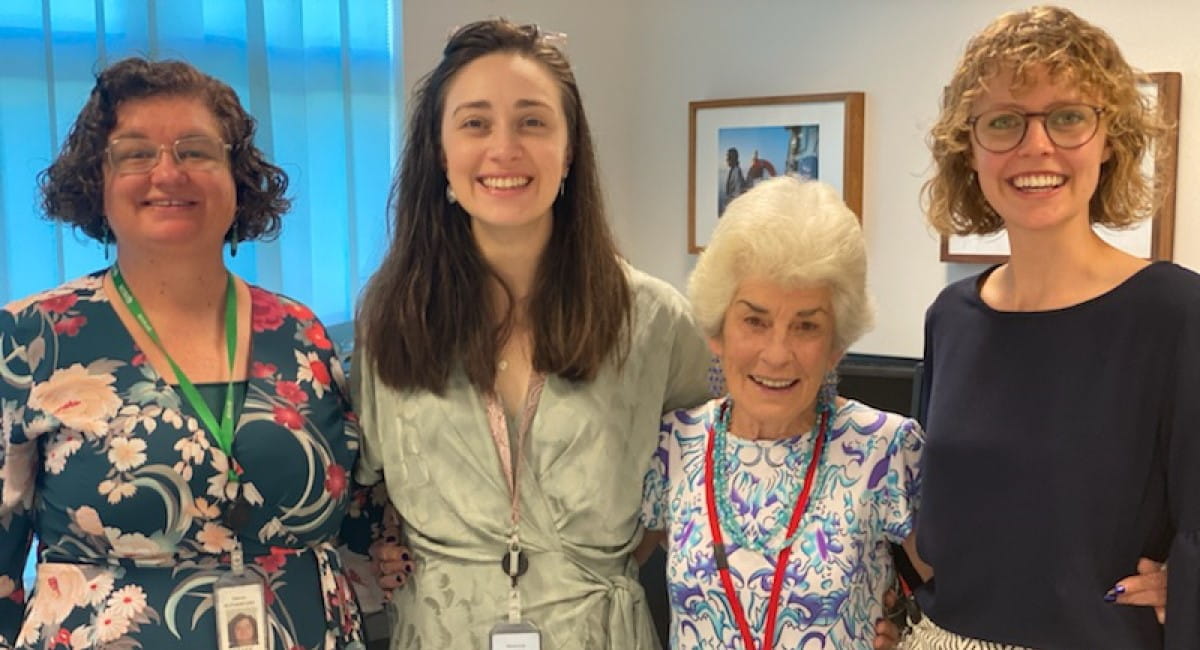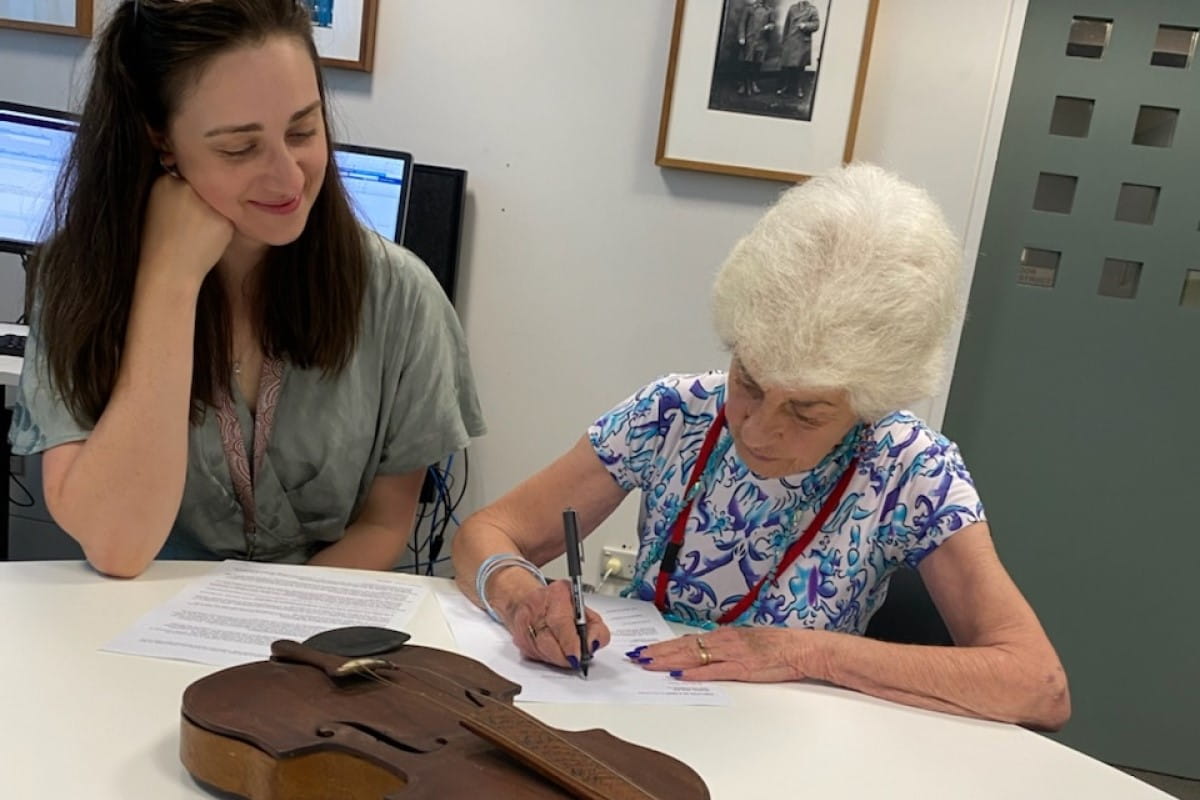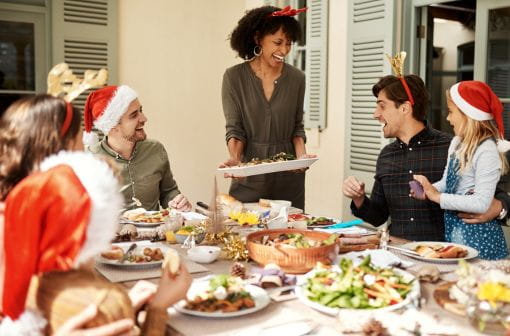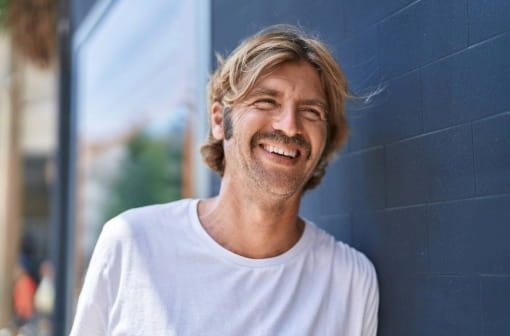“I was very fortunate, Australian Unity is just a wonderful organisation. They provided Lisa, my companion and driver to go down to Canberra. It was wonderful.”—Merrilyn Vaisey.
Merrilyn Vaisey’s father, Mervyn Vaisey, served as a World War II soldier in Buna, Papua New Guinea before she was born. “He didn't like talking much about it,” Merrilyn says, but there was one story that she did hear him tell fondly.
“When my father was in the war in Papua New Guinea, the Japanese bombed a cargo ship, and it was full of furniture. All this furniture was floating in the water, so Dad and his mate fished it out and from that furniture, he made two violins with a pocket-knife.”
Mervyn also carved a brooch out of mother-of-pearl, another from pearl and tortoise shell, an army badge, and a tie-pin made from a bullet casing. After the war he brought everything but one violin home to a new life that he started in Sydney.
The violin was a fixture in Merrilyn’s childhood. Mervyn was the headmaster of Merrilyn’s school, Forest Glen Primary, in the north-western Sydney suburb of Glenorie. She remembers him playing the violin as the children danced around the maypole.

“He played beautifully,” she says, “ABC Radio had him as a guest a few times. He used to take me down the back in the bush and try to teach me how to play it.”
Merrilyn didn’t take to the violin very well, so it was given to her brother. It wasn’t until his passing in 2014 that it came into her care – a personal responsibility she took even more seriously after learning about the second violin.
“I don't know how it happened, but I didn't know about the other violin. My policeman friend found it and told me it was in the National Museum in Canberra,” Merrilyn says.
Her friend Andrew also suggested she donate her violin to the Australian War Memorial. “I didn’t have the thought until he put it in my head, but I thought it was a great idea,” Merrilyn says. She began corresponding with the team at the Australian War Memorial in late 2020 to organise the donation of the items, in person.
Merrilyn was living in Mudgee by this time and hoped that a dear friend from Sydney could take her to Canberra. However, Greater Sydney was affected by COVID-19 so visitors to the War Memorial could not come from this area.
Merrilyn was understandably uncomfortable driving to Canberra alone. When her attempts to organise community transport fell through, she turned to Australian Unity to see what support she could receive as part of her Home Care Package, which she’d been receiving for three years.
“I was very fortunate,” Merrilyn says. “Australian Unity is just a wonderful organisation. They provided Lisa, my companion and driver to go down to Canberra. It was wonderful.”
Short-distance travel is a regular service provided by Australian Unity’s Home Care Services team—usually to assist customers with medical services or escorted shopping. The six-hour drive to Canberra had to be planned as an overnight service, but a team effort made it happen.
“Service Coordinator Sev Cengic helped with booking accommodation, creating the care plan details for the trip and logistics for getting the items to the Australian War Memorial,” Australian Unity Home Care Worker Lisa Howson, who accompanied Merrilyn to Canberra, says.

“My Allocations Coordinator Patricia Payne helped with scheduling services and booking the work car. Our Branch Manager Melissa Colwell also approved this very first Canberra trip for our Calare Branch and helped with calculating fees as per our guidelines, so that Merrilyn was aware of how much this would cost to her Home Care Package.”
With planning taken care of, Lisa and Merrilyn set off for Canberra on 10 February 2021. To avoid Sydney, Lisa had to detour through Bathurst. She also had to carry out extra COVID-19 protocols such as wearing protective equipment, social distancing where possible and only stopping when absolutely necessary to stretch and take a break from driving.
Helping with such an important occasion also meant a lot to Lisa, whose grandfather and two brothers are servicemen. “The morning we took Merrilyn’s treasures to the War Memorial I knocked on her door to accompany her to breakfast. She looked wonderful. You could feel her energy, excitement, pride, love for her dad and relief that her treasures were going to a place where they will be loved, cared for and admired.
Merrilyn was emotional when she met the Australian War Memorial Curators, which made me emotional. It really was beautiful to see.”
Donating the items in person was important for Merrilyn. “It just meant that much to be able to have it go from my hands to their hands and know it is in the right place. God knows what would’ve happened to them when I pass—they'd probably just be put in the tip or something. I wanted them to go where they should be, and that's the War Memorial.”
Disclaimer: Information provided in this article is of a general nature. Australian Unity accepts no responsibility for the accuracy of any of the opinions, advice, representations or information contained in this publication. Readers should rely on their own advice and enquiries in making decisions affecting their own health, wellbeing or interest. Interviewee names and titles were accurate at the time of writing.


